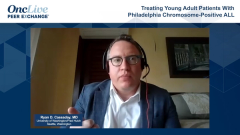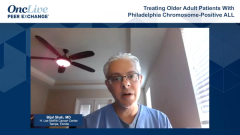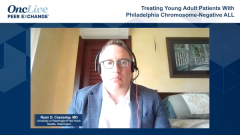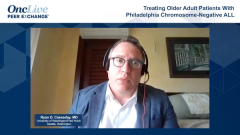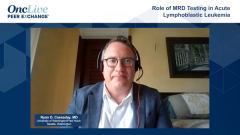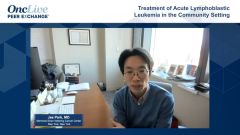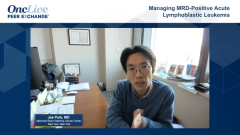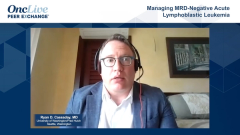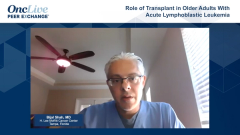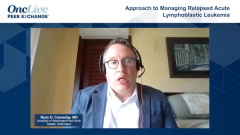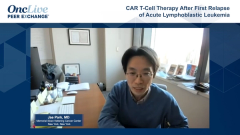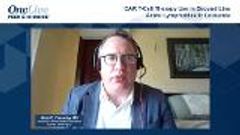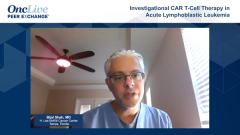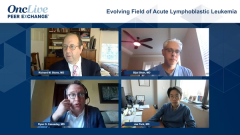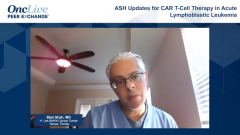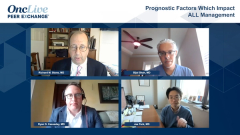
Prognostic Factors Which Impact ALL Management
Episodes in this series

Richard M. Stone MD: Hello, and welcome to this OncLive® Peer Exchange® titled “Integrating Newer Therapies Into Management of Adult Acute Lymphoblastic Leukemia [ALL].” I’m Dr Richard Stone from the Dana-Farber Cancer Institute in Boston, Massachusetts. Joining me in this discussion are my colleagues Dr Ryan Cassady, from the University of Washington Fred Hutchinson Cancer Research Center in Seattle, Washington; Dr Jae Park, from Memorial Sloan Kettering Cancer Center in New York, New York; and Dr Bijal Shah, from the Moffitt Cancer Center in Tampa, Florida.
Today we’re going to discuss a number of topics pertaining to advancements in the treatment of acute lymphoblastic leukemia. We’ll discuss the latest research in the field and the impact of recent clinical trials, including those described at the ASH [American Society of Hematology] 2020 Annual Meeting. Our first topic is going to be the changing paradigm of initial therapy in the treatment of acute lymphoblastic leukemia. Obviously in this complex disease, we’ve learned a lot about heterogeneity in terms of molecular and genetic classification.
I was wondering if I could ask Dr Cassady to start. Tell us how you view the complexities of ALL management.
Ryan D. Cassaday, MD: There are a lot of new data and new techniques coming out. Some of these are still waiting for more prospective validation or more data to mature to understand how to integrate them into routine practice. Right now, beyond establishing a diagnosis in the lineage, cytogenetic abnormalities, particularly the presence of the Philadelphia chromosome, and other cytogenetic abnormalities may have a prognostic significance. To a certain extent, some molecular features through genomic testing can be useful. However, that is still an evolving area. Beyond that, with a few exceptions perhaps, identifying the early T-cell precursor subtype of a T-cell ALL by flow cytometry is the key thing to look at in terms of disease itself when making initial therapy decisions.
Richard M. Stone MD: I agree. At our place, they look at age and Philadelphia chromosome positive or negative, which gives 4 subsets. I’d like to ask Bijal: Do you care if it’s T vs B in the initial setting?
Bijal Shah, MD: I do, and in particular early T. There’s a benefit for asparaginase-based therapy in early T subset in particular. There may be benefits to asparaginase even extending beyond that early T subset, relative to more adult-centered protocols like the hyper-CVAD [cyclophosphamide, vincristine, doxorubicin, dexamethasone] protocol, asparaginase-based protocols, CALGB 10403, and other protocols like the ones developed by Dana-Farber. There’s an advantage to trying to integrate asparaginase into that treatment paradigm to try to get a better outcome.
Richard M. Stone MD: Are you saying you wouldn’t use asparaginase? Or would you use more of it?
Bijal Shah, MD: I would use more of it. In particular in the early T cell.
Richard M. Stone MD: How do you do that?
Bijal Shah, MD: We have really modeled ourselves on the University of Texas MD Anderson Cancer Center approach to the treatment of leukemia. They use a lot of hyper-CVAD [cyclophosphamide, vincristine, doxorubicin, dexamethasone]. The way it was initially done was if started with hyper-CVAD, if there’s MRD [minimal residual disease] by imaging—suggesting there’s still residual mediastinal mass, for example—or by MRD in the marrow, at that point add asparaginase usually on day 5 to the hyper-CVAD [cyclophosphamide, vincristine, doxorubicin, dexamethasone] protocol. Now, with the CALGB 10403 data set published, a lot of these cases begin with the CALGB protocol, so we’re integrating this asparaginase into the induction.
Richard M. Stone MD: At Dana-Farber, we give everybody asparaginase, so the T versus B, at least initially, doesn’t make a huge difference. Although the CALGB 10403 is used the next generation of CALGB protocol, which involves the randomized addition of inotuzumab, for those patients they have to be pre B-cell. Jae, how about Philadelphia chromosome–like ALL? Do you need to know that before you start therapy?
Jae Park, MD: You certainly don’t need to know that information before you start the therapy. We do get that information, which takes the different ways of getting. At our institution, we’re getting it by NGS [next-generation sequencing] and Archer [FusionPlex] with targeted RNA sequencing, flow cytometry, and FISH [fluorescence in situ hybridization]. It’s all a combination of different approaches to get some information. It is fortunate to not have to specify them. These pathology tests will be run automatically, but depending on the type of testing and assays, they can take a few days to a couple of weeks easily. We usually don’t have that information at the beginning of therapy. At this time it does not impact initiation of therapy. We also use ALL asparaginase-based regimen, at least for younger patients. The information is received midway through the therapy, and there are other ongoing trials in the COG [Children’s Oncology Group] and others, looking at the addition of a targeted therapy to see whether they improvethe outcome. Maybe not necessarily the CR [complete response] rate, but event-free or the longer duration of remission for those patients.
Until that data become available there will be no changes at the moment. The biggest struggle is when the patient becomes MRD negative, whether they convert to high risk and should a transplant be considered. This is 1 key area that we are struggling with right now: What are the true prognostic implications, especially with the newer therapy with inotuzumab and blinatumomab in the earlierlines of therapy.
Richard M. Stone MD: The issue of whether the MRD status after the first cycle or 2 of therapy trumps the biology is key.
Transcript Edited for Clarity


